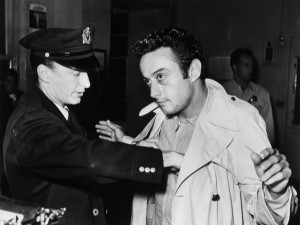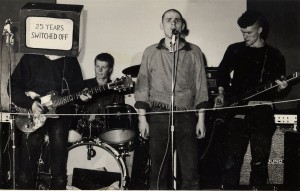BEN AFFLECK SAID while accepting his Oscar for Best Picture for Argo that:
“… It doesn’t matter how you get knocked down in life. That’s gonna happen. All that matters is that you gotta get up.”
He was talking about the resolve of artists, which we all encounter in the struggle to keep creating art. It is a testament to the spirit of human resilience in the face of sometimes overwhelming odds, which goes all the way back to our human core in the fact that homo sapiens even made it this far through the evolutionary maze. We feel it when we get the rejection letter but keep on writing or go on to do another show, or whatever it is our passion to do. We feel it in the small daily triumphs over the constraints imposed upon us by the capitalist business model. We feel it when we make the effort to go out instead of staying home. We feel it when our broken hearts begin to mend. We feel it in those moments when we transcend the pain and are fully present in the moment. We feel it when we stand up for what we believe in, and in a thousand different other ways.
Chumbawamba once wrote a song called Tubthumping (and check this out for a flash mob) which unknowingly tapped into this quintessential strand of the human condition. It became a world-wide hit. It made us one-hit wonders despite us having eleven studio albums, some of which contained far better songs. It gave the eight people in the band, and still gives us, a modicum of financial security to subsist as working artists in increasingly varied fields. We got lucky, and for that and many other reasons, I still love that song. And as an artist I accept that sometimes your work rebels like a petulant teenager and goes off and has a life of its own over which you have no control.
“The songs that inspire the troops on the road to Baghdad”
This was a headline from the English Daily Telegraph when the invasion of Iraq was in full swing in early April 2003. The article was about DJ Jonathan Bennett, who was working for British Forces Broadcasting Services, Middle East, based in Kuwait. Because the US army had not set up their own locally based troops’ radio station, as they had done in the first Gulf War, Bennett had become a “GI’s favourite.” In addition to serving British troops, his show also reached and had a large listenership amongst US troops. Moreover, “improvements in mobile technology mean(t) that Bennett and his colleagues (were) broadcasting right to the front line.” “The guys can actually tune in while they are fighting, if they want,” Bennett was quoted as saying.
The article went on, “Bennett has no doubt that the music he plays provides a vital emotional outlet for the troops. Indeed, some of the soldiers most popular requests, such as Chumbawamba’s Tubthumping (“I get knocked down, but I get up again / You never gonna keep me down”) sounded like rallying cries against not just the enemy in the desert, but the significant anti-war section of the British public.”
I can only speculate, but to think a soldier may have a tune that one co-wrote running through his head as an earworm, in the moments before he kills or is killed is unsettling. That the song would be perceived as an anthem against anti-war sentiment is simply beyond.
How sour the irony? It is one thing to have our taxes pay for wars we do not agree with — and this must surely be one of the most flagrantly abused shortcomings of our so-called democratic system. It is quite something else to have unwittingly provided part of the soundtrack for one of those wars as well. Whilst on reflection it did not come as a shock to us, as the authors of the song, that it would be used in this way, there was something shocking about the idea that part of ones’ art was being used to boost morale in fighting a war which we opposed with every bone in our collective political body.
There are of course other cultural implications. The song had been popular for an eighteen-month period from summer 1997 into 1998. Having been an anarchist band for the previous fifteen years, inhabiting the underground or the distant fringes of the mainstream, it was in many ways a genuine, though not unpleasant, shock to us to have an international hit record. In so doing, through the mass mediums of daytime radio and TV, we reached a significantly younger audience than we would normally have done, not least in the United States. It meant that we were being heard by children, as well as older teenagers and beyond, and it began to show in the audiences at our live gigs.
Quite suddenly we started seeing ten, eleven, twelve-year-olds down at the front of the stage, whilst in the back would be their sometimes hipster, sometimes bewildered, sometimes anxious-looking parents. Looking out into the crowd in Tempe in Arizona, in March 1998, during our song Big Mouth Strikes Again, where Alice Nutter comes on stage dressed as a cigarette-smoking, whiskey-drinking nun, we could see a worried parent stand up behind her daughter, putting her hands over the girl’s ears. That song was a tip of the hat, or should I say habit, to dead American comedian Lenny Bruce. Having had a hit record which did not necessarily reflect many of the other aspects of our work, not least the adaptation of Bruce’s exploration of profanity in the nun repeating the mantra “bullshit, motherf**ker, bullshit,” the parental reaction was hardly surprising. None of us in the band had children at the time, but we did perform that song late last year at the Chumbawamba farewell show in front of our own pre-teen children.
Whilst the emotional and political reach of any record is impossible to quantify, we had on some small level gone under the radar of conservative America, albeit for a passing moment. Having been inspired ourselves by punk and early Zappa and the Mothers of Invention — and in this context I am thinking in particular of their album We’re Only In it For The Money, which also referenced Lenny Bruce, who also had albums on Zappa’s Verve imprint— Tempe, Arizona was for me one of those rare moments when I witnessed the continuum of rock ‘n’ roll as an inspirational and/or confrontational force in our lives coming to the fore.
I digress. My point is that by 2003, the time of the US-led invasion of Iraq, some of those who were ten-, eleven- and twelve-year-olds in 1997 were now seventeen, eighteen, and nineteen-year-olds, and some of them were in Iraq making requests to Bennett’s or similar radio shows.
The other side of the coin is that some of those kids who were ten-, eleven-, and twelve-years-old in 1997-1998 took their places as hardcore protestors in the biggest anti-war movement the world has ever seen in 2002-2003. Letters and e-mails the band received charted some of the thought processes at work. As immediate pre-teens, people had known the song as just another upbeat daytime radio hit. Having gone back in subsequent years and listened to the song in context of the whole Tubthumper album they were struck by the political dimension that had eluded them when they were younger, but now had a resonance in George W. Bush Junior’s America.
The song used the metaphor of a drunk falling over and getting up again in the context of his local pub as soap-box, and took on a life of its own. We went from striking printworkers in Detroit coming on stage with us for the song to it being played over every conceivable sporting footage from American football, to a guy doing his televised ice-skating routine to it. It has been used in TV shows and all manner of films and, yes, in adverts too. Some of the money we donated to resistance movements who fall outside the nexus of registered charities. Some of the money has allowed us to continue to subsist as artists. When General Electric offered us $750,000 to use it for an ad for medical equipment in November 2001, we refused permission on the grounds that General Electric had whole pages of their web-site detailing their ’innovative designs’ which were part of the attack aircraft which were at that very moment bombing the f**k out of Afghanistan. The song put us in a cultural mine-field, but as musicians making a living it was a privilege to be lucky enough to make money doing what we loved doing.
A couple of years back an astronomer-musician friend of mine called to say that the astronauts on the Space Shuttle had woken up to ‘the song’ that morning. As a pre-teen myself growing up in the late sixties, because of the Apollo Space Program and the moon landing, I thought President Nixon was a great guy, and myself wanted to grow up to be an astronaut. I guess having our song played in space is as close as I am going to get to that childhood dream, though I must admit I did ponder the actualities of getting knocked down and getting up again in a no-gravity environment.
It hasn’t happened yet but it surely will–we will get a request for the use of the song in a Hollywood treatment of the war on Iraq, where a returning soldier who had his legs blown off has to learn to walk again using prosthetic legs. It stars a rookie Bruce Willis or a Mel Gibson and would get a thumbs down from us on a cheesiness level alone, before we even get into the politics.
That said, as an artist I know that I cannot, nor would I want to try to, proscribe any of the varying individual reactions to the work. We cannot define how someone chooses to hear a song and even if their interpretation was never envisaged when the song was created, it remains a valid one for the listener.
While I do not begrudge the fact that military personnel who had grown up listening to the song would choose to hear it whilst at work, I do not think the metaphor applies very well to actual war. Whilst it may be stating the obvious, some of the real soldiers hit by real bullets or real roadside bombs would not be getting up again. Similarly, a prime objective of their job was to make sure that the enemy, or anyone who was too close to the enemy by accident of proximity or based on what they looked like, did not get up again either. In this context the uplifting metaphor, with its inherent celebration of life, simply does not work.
Writing in response to the request to come up with a song with a world-wide message for the first-ever global TV link-up in 1967, The Beatles debuted All You Need is Love. John Lennon later described it, along with Give Peace A Chance and Power to the People, as an agit-prop song, saying “I’m a revolutionary artist. My art is dedicated to change.” Lennon also knew we needed more than songs about peace and love to bring about change. And many of us know that if karma really existed the obscenely wealthy would not continue to get even more wealthy to the detriment of everyone else on this degrading planet. Unless of course we are all going to come back as insects who will likely be the only ones to inherit the earth, should we continue on our current course.
So all, this talk of music as the soundtrack to our lives brings me back to getting knocked down and getting up again. I know, I know. I missed our anniversary. Two weeks back my head was full of thoughts and love and Regina. Don’t get me wrong. It is not a sin to feel love or to be distracted by feelings of love and/or pain in one’s heart. And in so doing, we sometimes counter-intuitively find the strength and compassion to be part of the change that this planet sorely needs.
February 15th was the tenth anniversary of the biggest anti-war demonstration the world has ever seen. Ten years prior I marched with my family —taking turns to push our three-year-old twins in a double buggy, waving homemade flags which said Americans Against the War— through the streets of London along with 1,999,996 other people. And in the biggest crowd of people I have ever been in, we still bumped into people we knew. The band had the previous year just done the soundtrack for Alex Cox’s Revenger’s Tragedy, and there was Cox, and screenwriter Frank Cottrell Boyce, and another American against the war Tod Davies, whose Exterminating Angel Press would some years later publish my first book and set me on the road which led me to The Weeklings here and now.
In the house I am currently renting near Twisp, in the wood room, concealed behind the door as you open it, left by the former residents and remaining hidden to me for months, is a full page people’s ad from the local Methow Valley News signed by hundreds of people, many of whom I now know from living here, declaring not least:
Let it not be said that the people of the United States did nothing when their government declared a war without limit and instituted stark new measures of repression.
There were demonstrations all over the world against the war. The war on Afghanistan was ongoing, and the war against Iraq was a done deal. In fact as I have outlined in these pages before the secret war was already underway at full throttle.
Only days earlier in February 2003, Colin Powell, ‘the good soldier,’ had already made his presentation to the United Nations in front of the world’s cameras, stating “facts and conclusions based on solid intelligence,” and illustrating his talk with satellite pictures said to show Iraq’s concealed chemical, biological, and nuclear weapons sites and holding up a dummy vial of anthrax to ram home the message. As Powell well knew, the US and Britain had been bombing Iraqi installations since the end of the first Gulf War under the guise of “patrolling the no-fly zone.” He also knew that the crippling sanctions against Iraq during the 1990’s had long since strangled any attempt by Iraq to get any WMD ambitions off the ground, as well as denying essential supplies resulting in the deaths of hundreds of thousands of Iraqi children. He also knew that the US and Britain had been ramping up the bombing of Iraq on a daily basis since July 2002, ‘softening it up’ for the full scale invasion that was to come.
If some of us on the marches did not know all the details, we intuitively knew that the US and British governments, in the absence of any real intelligence, were deploying the ‘shock and awe’ equivalent in PR to give a gloss of legitimacy to their inevitable war. They were going to invade Iraq anyway, and they did, and they achieved their primary aim–of keeping US boots on the ground in ‘the arena’ for eight and a half years. In gangster-like fashion, it was a lesson in brute force to deter any would-be competitors from getting too close to Iraqi oil, and it gave a bonanza of highly lucrative kickbacks to Western corporations, transferring wealth from the humble taxpayer to the already obscenely wealthy.
Under President Obama, the war machine is every bit as engaged, and the measures of repression have been consolidated and expanded with the specific intention of extending the shelf life of perpetual war as the preferred way of doing business in the twenty first century.
I don’t say any of this to negate the feeling of solidarity of protest and anger we felt on that cold February day back in 2003. It was truly amazing to be part of the biggest demonstration in British history and the biggest anti-war demonstration the world had ever seen. I simply say all this to remind us that the axis of dissent is alive and well and will have its day again. That the global community which has a million strands with a common core of fighting everyday injustice will get up again on a grand scale, as it gets up every single day in smaller increments.
February 17th 2013 saw the biggest ever climate demonstration so far, with over 40,000 people gathering in Washington DC to urge the Obama government to make good on its promises to address global warming. High on the list of demands was urging Obama to refuse to allow the Keystone XL tar sands pipeline, or any quick-fix substitutes, to be built. Protests to stop the Keystone XL pipeline are a daily occurrence
If we are unaware of such dissent it is because the mainstream media is so firmly in the grip of corporate interests, as it has increasingly been since the wake of the VietNam War, that we are temporarily blinded to reality by a manufactured all-pervading aura of business as usual. So part of our duty as artists, as Lennon suggested, is to break through the firewall of the narrative of vested interests, as I humbly try to do on occasion through my writing and art.
None of us know how or when the change will come, and that includes the US intelligence agencies whose job it is to predict change, not least by monitoring and occasionally hauling in those they see as domestic subversives, most recently here in the Northwest with FBI raids on anarchists involved with the Occupy movement.
What we can say is that with the unceasing model of consumerist culture on an over-populated planet with dwindling resources and increasing extreme weather events, a decisive change will come in some form at some time…probably in our lifetimes and almost certainly during that of our children. As an axis of dissent people around the world are forever being knocked down, but we are forever getting back up again, buoyed by that part of our human nature that wants to see a better world for our communities and our children.
So here is another anniversary worth getting up for. June 24th 2013 is the twenty fifth anniversary of Dr. James Hansen’s testament to the Senate, that global warming was real, man-made, and was upon us. The mainstream narrative since then has been dominated by twenty-five years of fake science and fake grassroots consumer groups bankrolled by the fossil fuel industry. It has been twenty-five years of pro-oil lobbyists winning twenty five years worth of Congressional procrastination. It has been twenty-five years of excessive and increasing additions of CO2 to the atmosphere. This is the measure of the crash that is upon us and is coming with increasing force, and it epitomizes all that is wrong with the preferred business model of the vested interests running the planet. In the times when we are knocked down it seems like we have already missed the boat and we are too late, but with the well-being of the planet, the home of our global community, and our very survival as a species at stake, we are going to see more and more people getting back up again and shouting and being the change.







How ironic. But TUBTHUMPER is the least political of Chumbawamba’s songs, which is perhaps how it received the most airplay. It’s a great anthem, but as Dr. Nobacon observes it is a minor note in the amazing history of the Chumbas. Cue “Passenger List”!